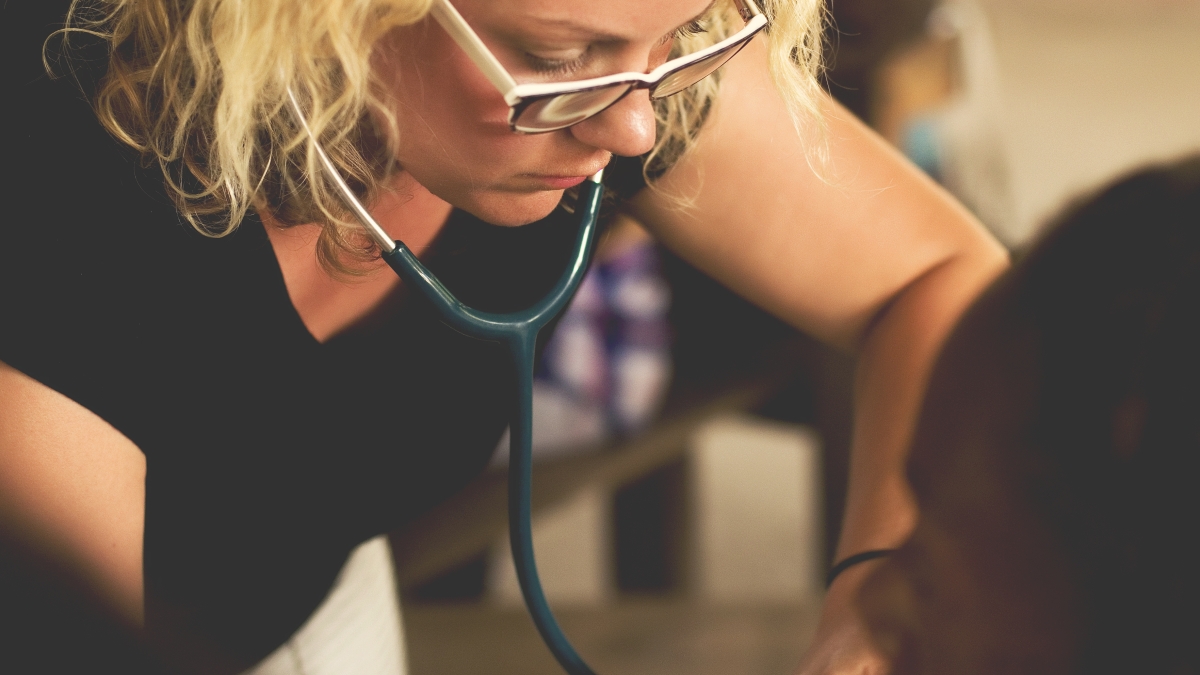Midwife pursues online degree to improve mother, infant health

Ashley Stills checks a pregnant woman's blood pressure. Photo courtesy of Ashley Stills
First-year student Ashley Stills is on a mission to serve mothers and their newborns in local and international communities. To better equip herself for this work, she is beginning an online global health program with Arizona State University's School of Human Evolution and Social Change this fall.
Stills currently works as a midwife for Amish communities in Indiana. Midwives care for women and their newborn babies before and during pregnancy, at birth and after delivery. According to the World Health Organization, they bring a host of benefits, including fewer diseases among mothers and infants and fewer interventions in labor. However, around 20% of live births worldwide are still not assisted by a skilled attendant.
Though her stateside work was rewarding, Stills saw the chance to do more, and in July 2014, she founded Breath of Life Haiti, a nonprofit that provides midwifery and educational services.
“Breath of Life Haiti has a holistic approach to serving the community and implementing programs; understanding a whole person is intimately interconnected physically, mentally, socially and spiritually,” she said.
Stills answered questions about her work, this newest challenge of pursuing an undergrad degree in global health and her future goals.
Answers edited for length and clarity.
Question: What made you decide to join the online global health program?
Answer: I researched various universities that would be able to accommodate my unique schedule of being a wife, mom, nonprofit leader for an international organization and a midwife with an on-call schedule. After thorough research, I believe ASU is going to be a good fit for my busy lifestyle.
Q: How did you get interested in studying global health?
A: Through my passion to serve women and families internationally. As the founder and director of a nonprofit organization, I recognize the importance of understanding cross-cultural behaviors and dynamics of medical care systems and facilities.
Q: How long have you been a midwife? What do you find rewarding about it?
A: I recently graduated from midwifery school. For a majority of my clinical placement, I served a high volume of clients within the plains population. Indiana has the third largest Amish population. Residing in Northern Indiana, I plan to continue serving the Anabaptist as well as women and families in Haiti.
Midwifery is a demanding profession. However, it is very rewarding. Life is precious. When a woman chooses me to be her provider, we enter a partnership. It is always an honor to be entrusted with providing care while empowering women to make informed decisions regarding their care.
Q: What challenges do you see in providing mother and infant care in Haiti, and how is your nonprofit organization helping with those challenges?
A: With a population of over 10 million, Haiti is the poorest country in the Western Hemisphere. Due to geographic remoteness and socioeconomic status, many mothers in Haiti do not receive the care they require. In fact, only about 25% of births in Haiti are attended by a skilled provider.
As a result, Haiti is the most dangerous country in the Western Hemisphere to give birth. Most of maternal deaths there are caused by eclampsia, sepsis and postpartum hemorrhage — in other words, are preventable. Haiti also has the highest rates of infant and under-5 mortality in the Western Hemisphere. Children who have lost their mothers are up to 10 times more likely to die prematurely than those who have not.
Today, Breath of Life Haiti serves hundreds of people each year in the community of Dèsarmes, Haiti, providing midwifery care and programs with a vision of education and empowerment. Our vision is to breathe life into individuals, families and community through opportunity, education, midwifery care and the love of Christ. We currently employ 23 Haitian community members: a program director, midwives, birth assistants, adult education teachers, primary school teachers and cooks.
Over the past three years, we have provided midwifery care to over 450 families; 32 individuals have graduated from the Level 1 adult education program (reading, writing, math); and 68 adults have completed the business training program. We also provide education and school lunches to 150 children each year at the primary school. Currently, our midwives provide midwifery care to approximately 170 women and babies a year.
Q: What are your future goals?
A: My goal is to continue empowering women and families within my community as well as internationally. Someday I would like to be involved in international policies for maternal and child health in Haiti and other countries. I am hoping that the field of global health will help me address the unique challenges with international populations.
More Health and medicine

Bird flu: Your questions on symptoms, spread and safety answered
Bird flu is no longer only “for the birds.”Infections have expanded beyond wild birds and poultry to a range of animals — from…

Making medicine side-effect free
Many drugs that address medical conditions can come with serious side effects. In drug commercials, the litany of potential side…

Diagnostic research happening at ASU focused on detecting diseases earlier to save lives
It was one of America’s founding fathers, Benjamin Franklin, who may have foreshadowed today’s health care innovation when he…

